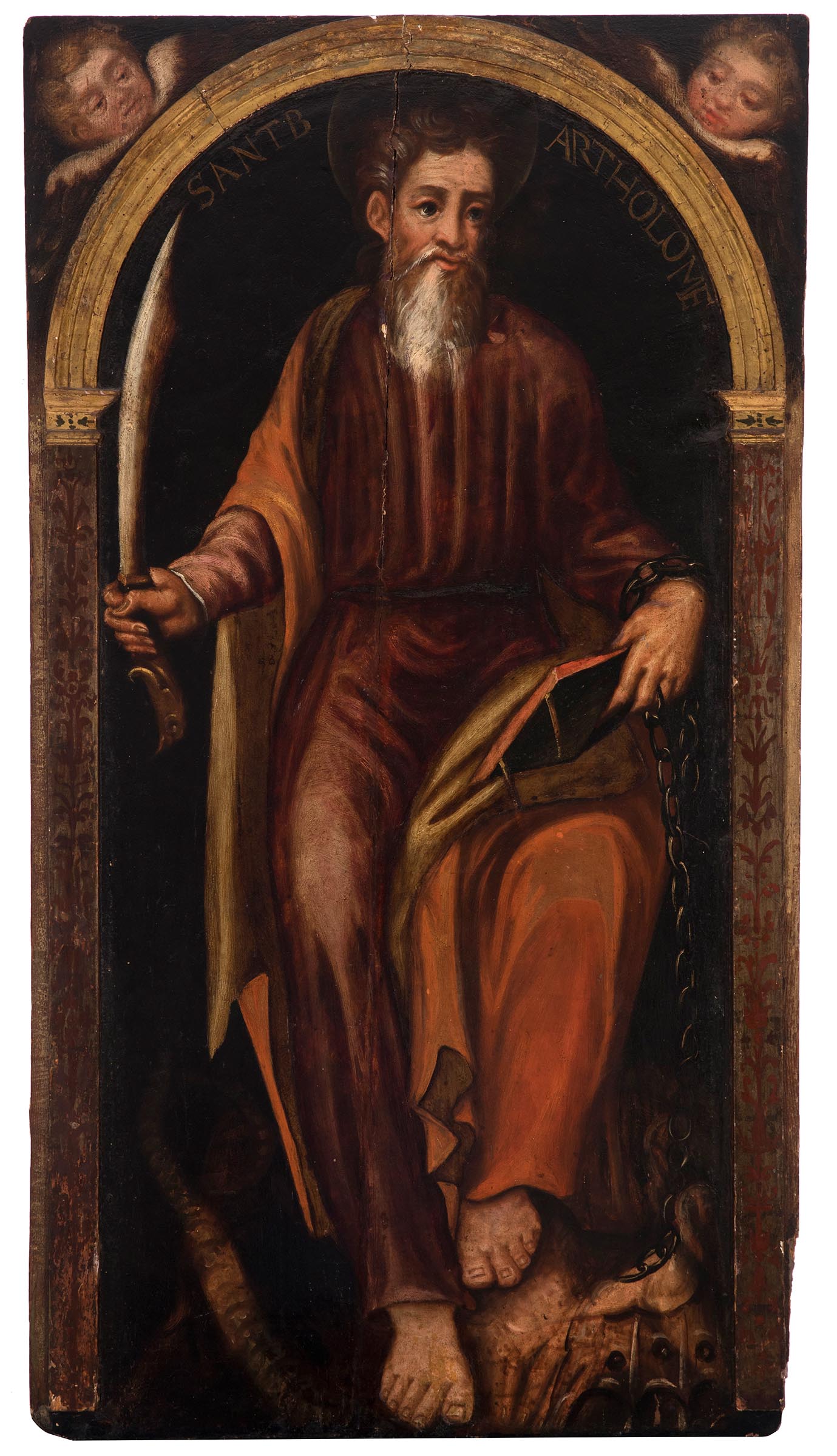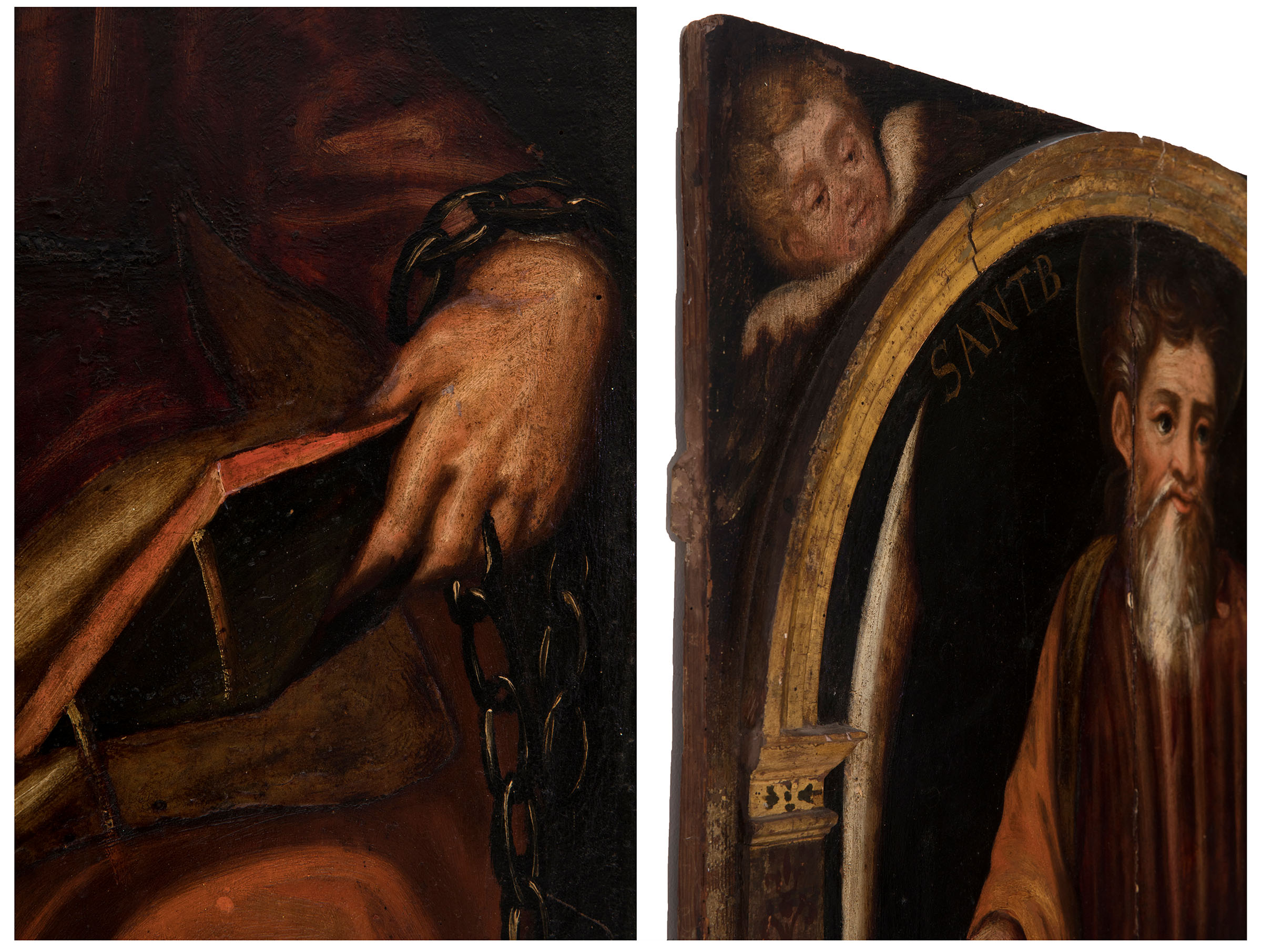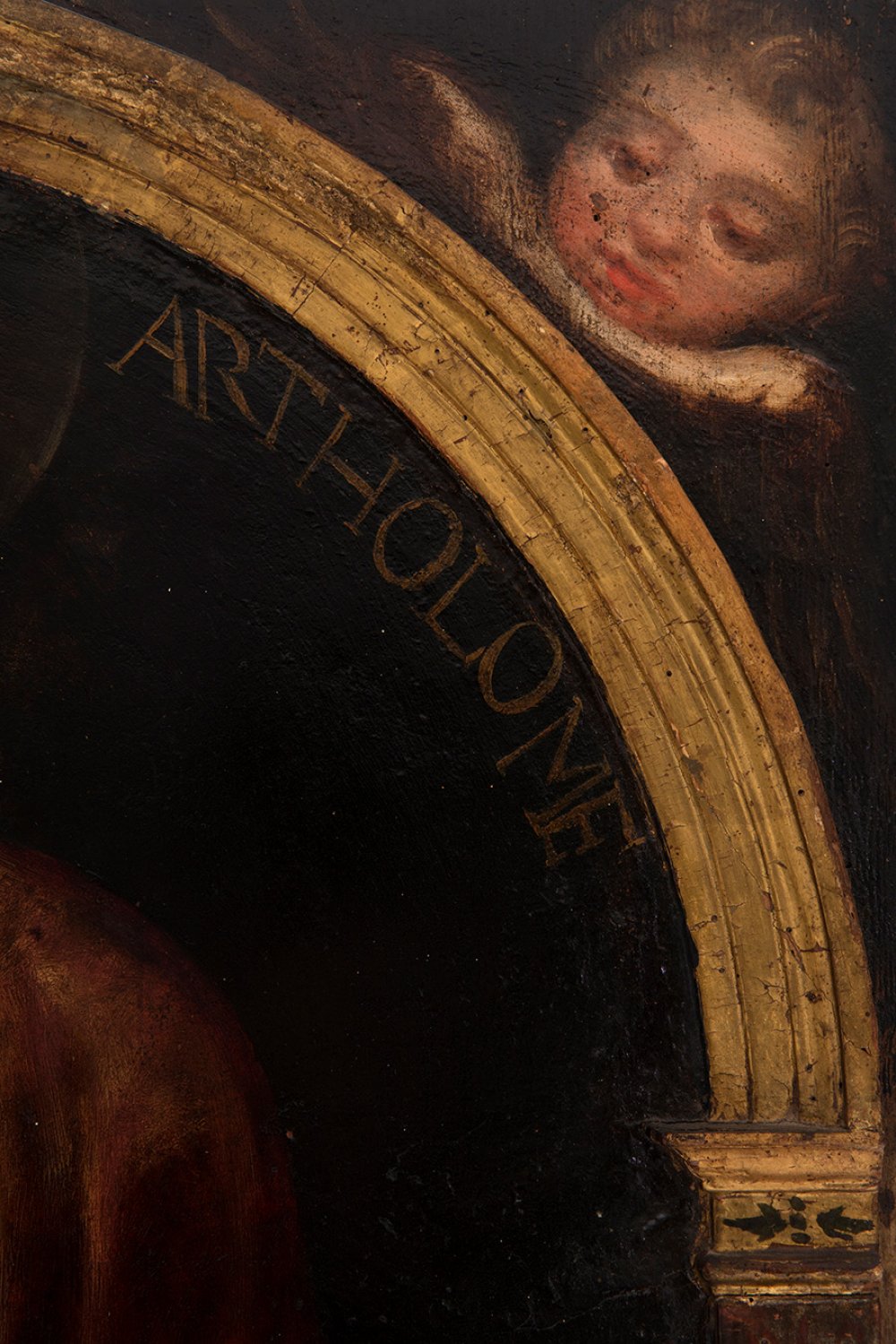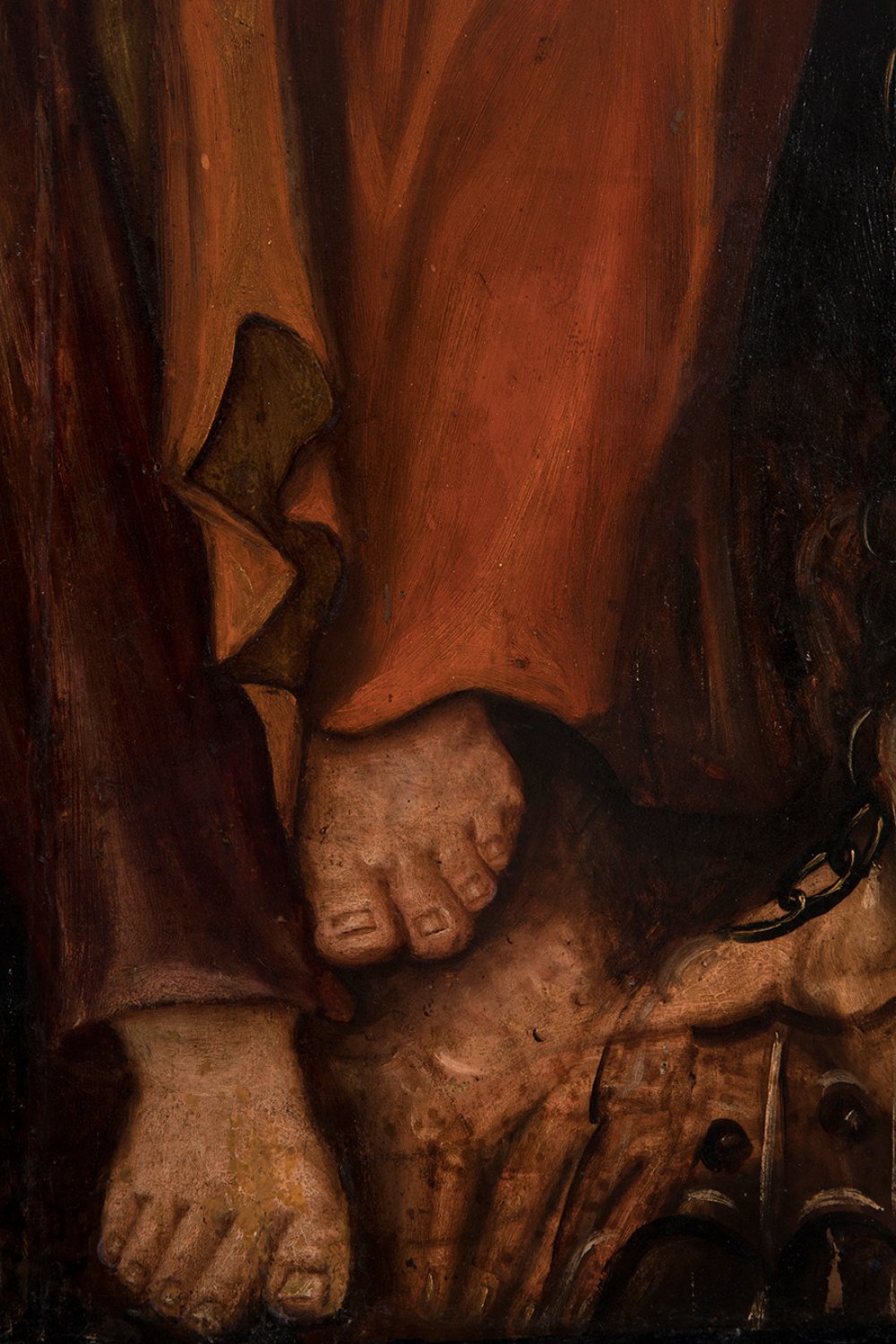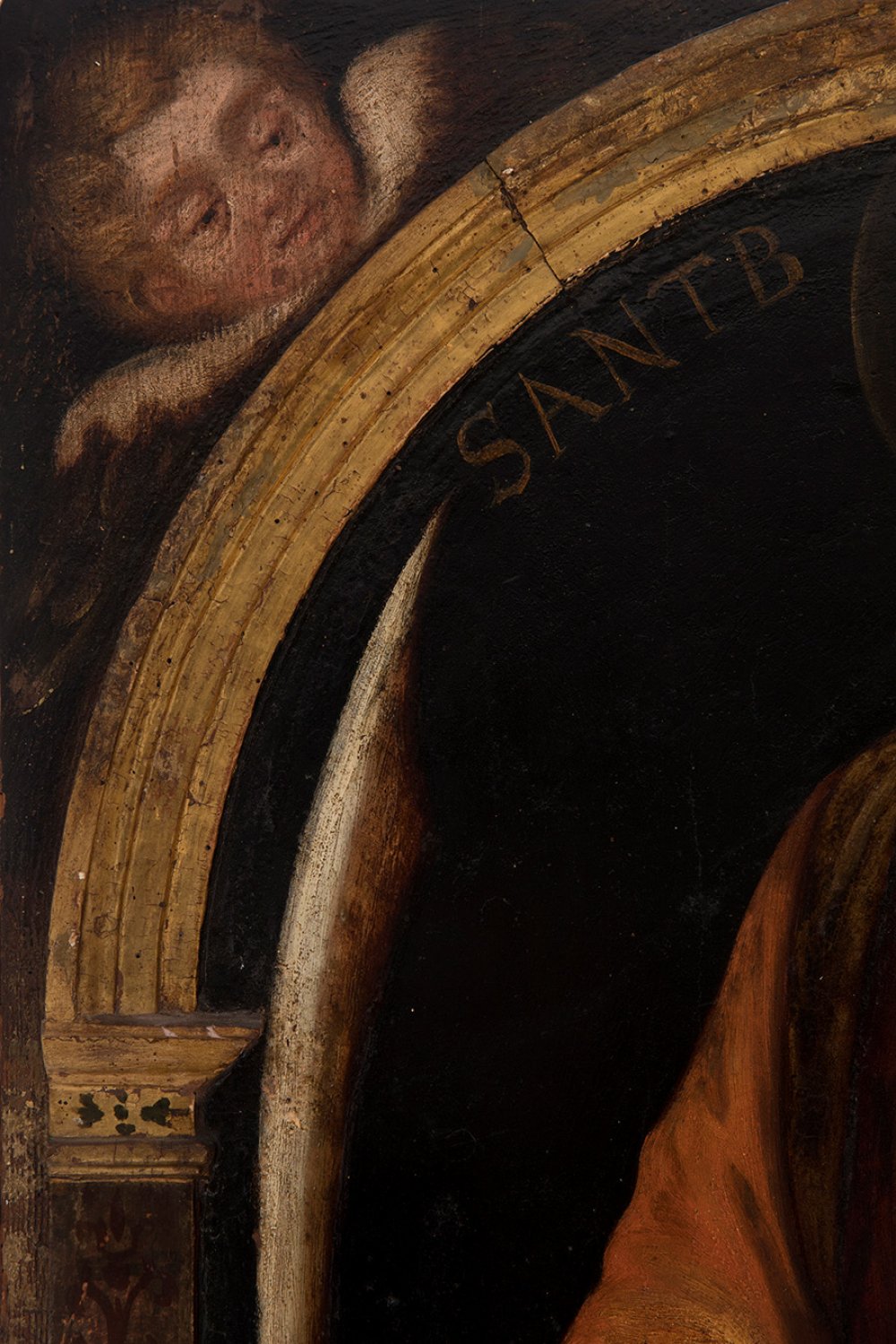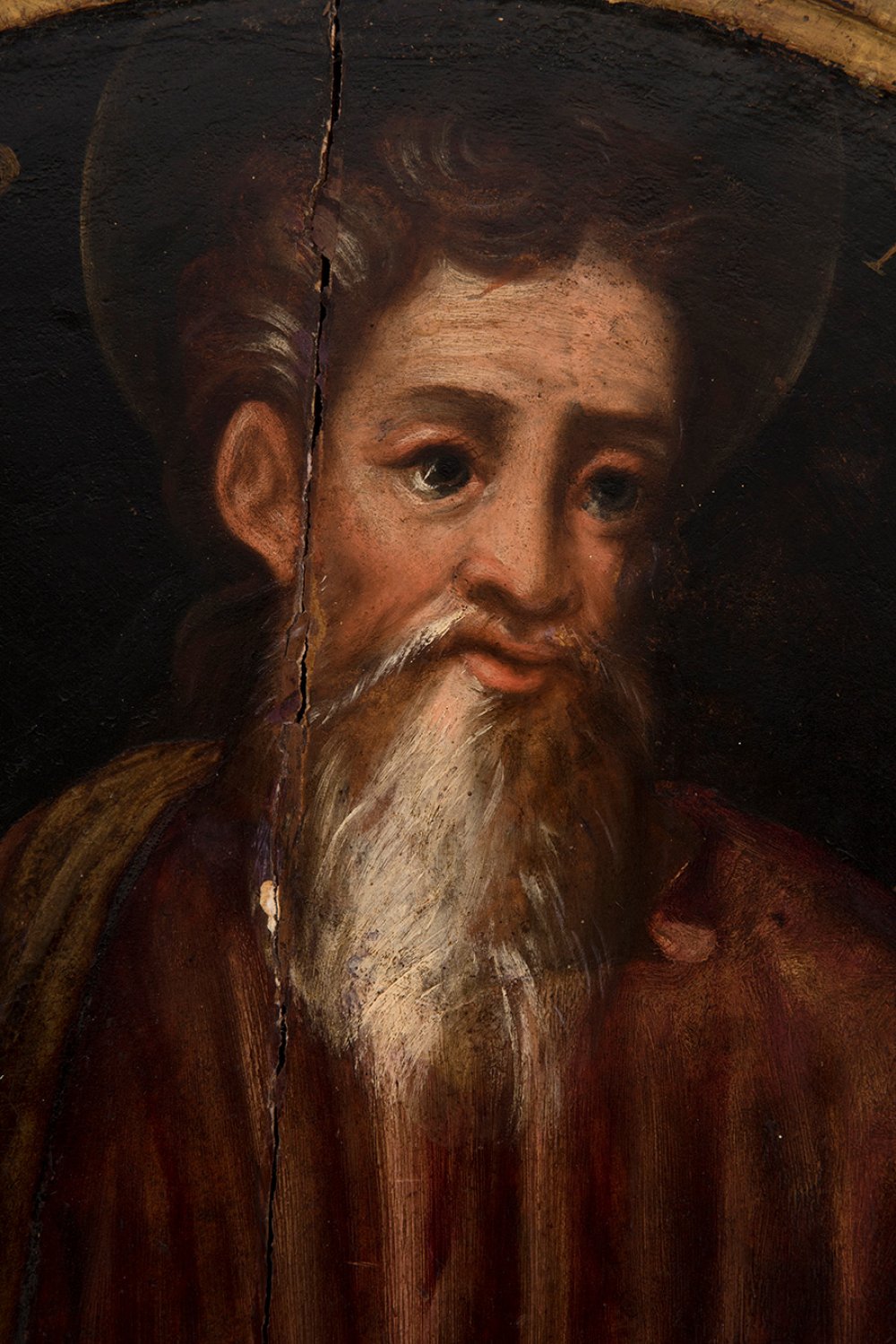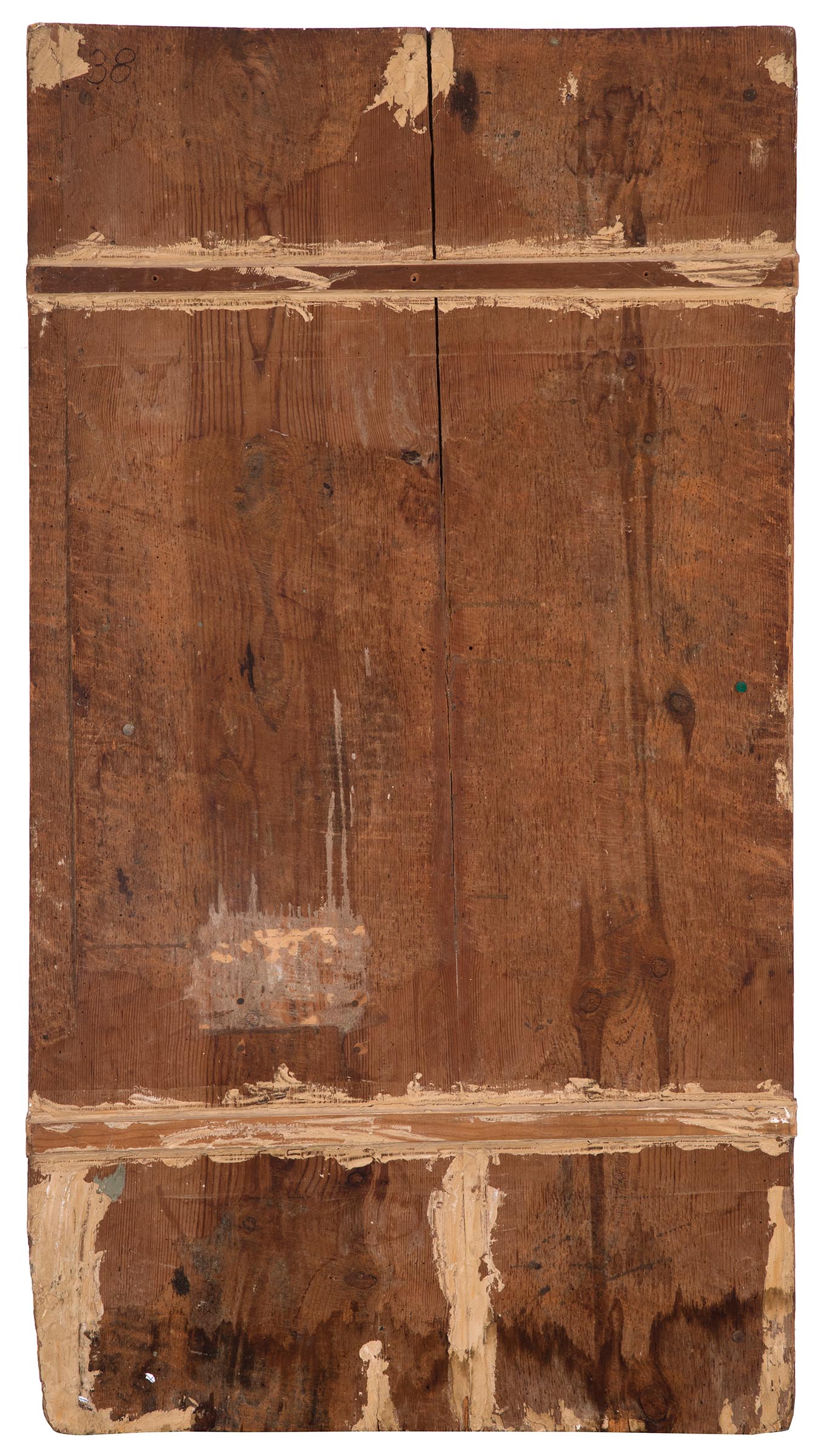46
Spanish school; ca. 1600."Saint Bartholomew".Oil on panel. Engatillada.It has repainting and
"Saint Bartholomew".
Oil on panel. Engatillada.
It has repainting and restorations.
The panel is open in the central area.
Measurements: 120 x 65.5 cm.
Inscribed in a semicircular arch, whose upper area is crowned by two little cherub heads, each on one side, the imposing figure of a saint can be seen. After the theatricalisation of the subject provided by the arch, the artist has placed a black background, thus giving great prominence to the central figure. An elderly man, as can be deduced from the white beard, is seated despite the fact that his figure occupies almost the entire surface of the work. The old man, who wears a tunic and cloak, holds a sword in one hand and a book in the other, which he rests on his leg. In this hand, a large chain can also be seen hanging from his wrist to the ground. The aforementioned attributes, together with the nimbus of sanctity and, of course, the name that crowns the image of the saint, refer directly to Saint Bartholomew.
Bartholomew was one of Jesus' apostles, and is mentioned in the Gospels always in the company of Philip. According to John, in whose Gospel he appears under the name of Nathanael, he was one of the disciples to whom Jesus appeared at the Sea of Tiberias after his resurrection. According to the Acts of the Apostles, he was also a witness to Jesus' ascension. The tradition recorded by Eusebius of Caesarea recounts that Bartholomew went to preach the Gospel in India, where he left a copy of Matthew's Gospel in Aramaic. Armenian tradition also attributes to him the preaching of Christianity in the Caucasus country, together with Saint Jude Thaddeus, and both are considered patron saints of the Armenian Apostolic Church. Their martyrdom and death are attributed to Astiages, king of Armenia and brother of King Polymius, whom the saint had converted to Christianity. When the priests of the pagan temples, who were running out of followers, protested to Astiages about Bartholomew's evangelising work, the ruler sent for him and ordered him to worship their idols, just as he had done with his brother. When the saint refused, the king ordered him to be flayed alive in his presence until he renounced God or died. The image of Saint Bartholomew has undergone few modifications throughout the history of art, and it is common to depict the saint at the moment of martyrdom. Thus, he is usually depicted being flayed, either on a rack or tied to a tree. He has also been depicted working miracles: resurrecting the sons of King Polymius and freeing his daughter, who was possessed by the devil. On rare occasions he is depicted being scourged. He is sometimes depicted with a large knife, alluding to his martyrdom, according to which he was flayed alive, which is why he is the patron saint of tanners. In connection with his martyrdom, he is also sometimes depicted skinned, his skin being held on his arm as if it were a piece of clothing.
"Saint Bartholomew".
Oil on panel. Engatillada.
It has repainting and restorations.
The panel is open in the central area.
Measurements: 120 x 65.5 cm.
Inscribed in a semicircular arch, whose upper area is crowned by two little cherub heads, each on one side, the imposing figure of a saint can be seen. After the theatricalisation of the subject provided by the arch, the artist has placed a black background, thus giving great prominence to the central figure. An elderly man, as can be deduced from the white beard, is seated despite the fact that his figure occupies almost the entire surface of the work. The old man, who wears a tunic and cloak, holds a sword in one hand and a book in the other, which he rests on his leg. In this hand, a large chain can also be seen hanging from his wrist to the ground. The aforementioned attributes, together with the nimbus of sanctity and, of course, the name that crowns the image of the saint, refer directly to Saint Bartholomew.
Bartholomew was one of Jesus' apostles, and is mentioned in the Gospels always in the company of Philip. According to John, in whose Gospel he appears under the name of Nathanael, he was one of the disciples to whom Jesus appeared at the Sea of Tiberias after his resurrection. According to the Acts of the Apostles, he was also a witness to Jesus' ascension. The tradition recorded by Eusebius of Caesarea recounts that Bartholomew went to preach the Gospel in India, where he left a copy of Matthew's Gospel in Aramaic. Armenian tradition also attributes to him the preaching of Christianity in the Caucasus country, together with Saint Jude Thaddeus, and both are considered patron saints of the Armenian Apostolic Church. Their martyrdom and death are attributed to Astiages, king of Armenia and brother of King Polymius, whom the saint had converted to Christianity. When the priests of the pagan temples, who were running out of followers, protested to Astiages about Bartholomew's evangelising work, the ruler sent for him and ordered him to worship their idols, just as he had done with his brother. When the saint refused, the king ordered him to be flayed alive in his presence until he renounced God or died. The image of Saint Bartholomew has undergone few modifications throughout the history of art, and it is common to depict the saint at the moment of martyrdom. Thus, he is usually depicted being flayed, either on a rack or tied to a tree. He has also been depicted working miracles: resurrecting the sons of King Polymius and freeing his daughter, who was possessed by the devil. On rare occasions he is depicted being scourged. He is sometimes depicted with a large knife, alluding to his martyrdom, according to which he was flayed alive, which is why he is the patron saint of tanners. In connection with his martyrdom, he is also sometimes depicted skinned, his skin being held on his arm as if it were a piece of clothing.
28th September - Old Masters
Sale Date(s)
Venue Address
General delivery information available from the auctioneer
Setdart offers Worldwide shipping
PICK UP IN ROOM: You can come and pick up your lots in our offices (Barcelona, Madrid or Valencia). At the moment of the withdrawal, you will be able to accept the current conditions of the lot by means of a document that you will sign.
YOU CAN SEND ANOTHER PERSON TO PICK UP: This person must present a signed authorization that you can find in our web page by accessing from BUY AT SETDART- LOGISTICS-DOWNLOAD AUTHORIZATION DOCUMENT. You can also send an e-mail with the requested data in AUTHORIZATION DOCUMENT to admin@setdart.com
Important Information
25% buyer´s premium
21% buyer´s premium at www.setdart.com
Terms & Conditions
The maximum period to pay the lots is 7 working days. You can pay either via bank transfer or with credit card through our platform www.setdart.com (we only accept VISA or Mastercard).
BUYER´S PREMIUM: 22% Hammer price + 21% VAT from the buyer´s premium
If your piece has more than 100 years, our Ministry of Culture requires an export certificate in order for the piece to leave the country. Note that if the piece goes inside the EU, there is no cost for the export certificate. If the piece goes outside the EU, there is a cost for the export certificate. You can find more information in our Ministry of Culture website: https://www.culturaydeporte.gob.es/en/cultura/patrimonio/exportacionimportacion/exportacion/tasas.html
INQUIRIES: admin@setdart.com
Setdart guides you through the entire process, from the time of award to the day you receive your lot. Our logistics team will be happy to manage your transport, and will advise you on the best shipping method with professionals from the sector used to handling works of art and jewelry.
WE OFFER WORLDWIDE DOOR TO DOOR SHIPPING
PICK UP IN ROOM: You can come and pick up your lots in our offices. At the moment of the withdrawal, you will be able to accept the current conditions of the lot by means of a document that you will sign.
YOU CAN SEND ANOTHER PERSON TO PICK UP: This person must present a signed authorization that you can find in our web page by accessing from BUY AT SETDART-LOGISTICS-DOWNLOAD AUTHORIZATION DOCUMENT. You can also send an e-mail with the requested data in AUTHORIZATION DOCUMENT to admin@setdart.com
SETDART IS NOT RESPONSIBLE FOR THE STATE OF THE PARTS ONCE THEY LEAVE OUR FACILITIES. MRW SHIPMENTS: Once the payment is made, your lot will be packed for shipment, the logistics department will send you an e-mail notifying you of the day it leaves our warehouse, changes of address cannot be made after receiving this e-mail.
INSURANCE INCIDENTS: Coverage for the value of the auction up to 3000 ? per shipment, if the value of the auction is higher, Setdart will send you a quote including the additional insurance. The insurance company WILL NOT BE RESPONSIBLE FOR THE SHIPMENT THAT EXCEEDS THAT AMOUNT AND IS NOT FULLY INSURED. MRW INCIDENTS: Maximum notification 48 hours after receipt, after which the insurance company WILL NOT BE RESPONSIBLE AND NO CLAIMS WILL BE ACCEPTED.
E-MAIL LOGISTICS: logistica@setdart.com
PICK UP YOUR MESSAGES: You can send your own messaging, prior notice via e-mail that your shipment is ready, please note 3 or 4 days in advance. This type of shipment is packaged so Setdart will provide you with a quote.
EXPENSES FOR STORAGE: We inform you that if the purchased lot is not picked up within a month, you will be charged 30€ per week per lot. Setdart Online S.L., owner of the web site "setdart.com", "setdart.net" and "setdart.org", acts as a company of Spanish nationality inscribed in the Volume 36955, sheet 182, page B-293056 of the Mercantile Registry, with registered office at Calle Aragó















